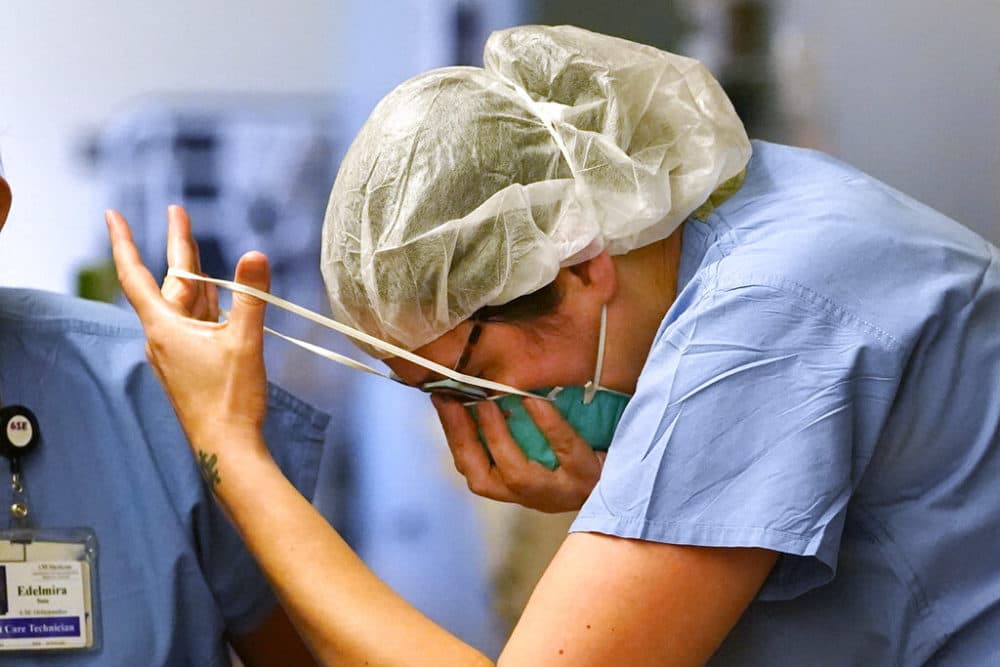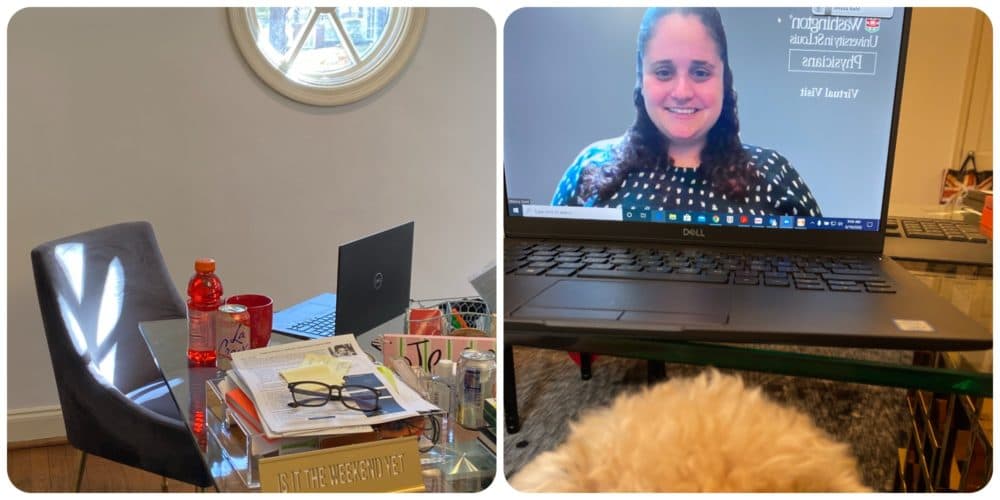Advertisement
Commentary
I'm A Psychiatrist Who Treats Health Workers. A Year Into The Pandemic, We're All Suffering From Burnout
Resume
A couple of Saturdays ago, I slept in until 11 a.m. I haven’t done that since college. As I peeled myself out of bed, I convinced myself it was just one of those days. I must’ve needed the sleep, and a lot of it.
When my phone rang, I felt torn between desperately wanting to talk to friends and family to ease my social isolation, and feeling emotionally drained from my day-to-day work as a psychiatrist. That Saturday, I silenced the incoming call.
I’ve never considered myself a frontline worker. And until very recently, I didn’t think it was even possible for me to experience pandemic-related burnout. As it turns out — I was wrong. Sleeping through the weekend, becoming physically angry about emails, and feeling like I have no empathy or energy left to give are my tell-tale signs.
The irony of all this, is that I’m an expert on burnout among physicians, a condition that afflicted up to 50% of professionals even before COVID-19. During the pandemic, uncertainty and novel workplace stressors have compounded to make burnout exponentially worse. I see it first-hand in my patients, who are predominantly health care workers. Somehow, I just failed to put the pieces together and name my own experience.
I have been listening to my patients' narratives from the medical frontline since last March. While I might not be in the COVID-19 wards personally, I am regularly transported there with their words. A nurse tells me about holding up a phone or iPad up to a dying patient’s ear, as their families say goodbye. I’ve heard others describe their panic around the very real risk of contracting COVID-19 and bringing it home to their families. I hear the hopelessness they carry — that this will never end if people refuse to wear masks or get vaccinated.
While I might not be in the COVID-19 wards personally, I am regularly transported there with their words.
In the times before COVID-19, it was easier to draw a barrier between my life and my patients’ lives, but it is so hard now. We are all going through many of the same experiences. Every person is my friend or my family. Every story feels familiar. It’s hard to remove myself or let it go at the end of the day. It is hard not to cry.
And, I know it will only get worse when the adrenaline stops and the pandemic ends. Trauma has no timeline and that’s what we’re all experiencing, sustained and widespread trauma. When we finally have time to ask ourselves how we are feeling, the answer is likely going to be, not well.
To make matters worse, I’ve also noticed that my patients are not getting better. The woman who has been stable for five years, is worse now, and we can’t find the right medications to help ease her depression. A college student who is drinking more heavily, tells me he is just waiting for the pandemic to be over to start enjoying life again.

Most of my clients need therapy, but most of them can't find a therapist with openings. They sit on long wait-lists; everyone needs therapy in this country right now. To help, I’m doing more talk therapy sessions than ever, but it still isn't enough. In a pandemic, issues are less able to be fixed, and certainly not by medication. There is no drug to wipe out the compounding stressors like grief, job loss or racial injustice. I know this, yet I constantly feel ineffective at “fixing” their problems, and this only adds to my own burnout.
As my own therapist reminded me, fixing problems isn’t the intent of all treatment. I can be successful and helpful to my patients, by being someone who is there and listening. I also realized I could be helpful to my patients, by being a little more vulnerable about my own experience.
To do that, I first needed to figure out how to cope, and know when to prioritize my own needs. I needed to take days off — even if that meant I would still be in my house — because that was the only way I could be fully engaged during my clinical work. I needed to remember I was human. I could then practice more of what I preach — and tell my patients what I had learned about myself: I am a work in progress, but I, too, am suffering from burnout, learning how to manage, and am still a good doctor. Perhaps it even makes me a better one.
Trauma has no timeline and that’s what we’re all experiencing, sustained and widespread trauma.
As I was getting ready to hang up a call recently, a patient said he wondered how I was taking care of myself, because he couldn’t imagine what it was like to be in the mental health field right now.
I said, with more authenticity and openness than I had ever told patient: “I have a therapist — and a lot of us do — and that way, when you or anyone else tells me anything, you never have to worry I can’t handle it, because someone is helping me process and holding me up.”
He replied, “That makes me feel really happy and really good, honestly.”
Truth be told, him asking and caring, and appreciating my answer, made me feel really good, too.
Physicians are trained in a medical system that, by and large, treats burnout as a byproduct of our jobs and a badge of honor — even as it leads to depression, errors in patient care and people leaving the profession.
It feels taboo to say, but caring for others can and does lead to burnout, especially in a pandemic. But when we can admit it is hard, and our patients not only understand, but like us better for it, that is magic.
That is the healthcare system I want to see in the future, and would not want to leave.
This segment aired on March 8, 2021.
